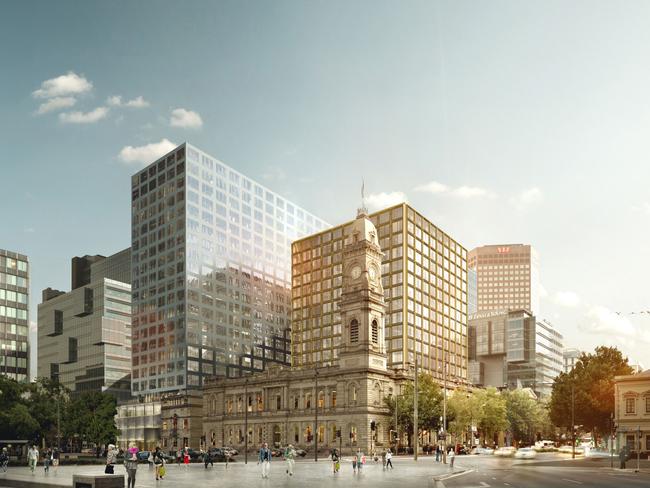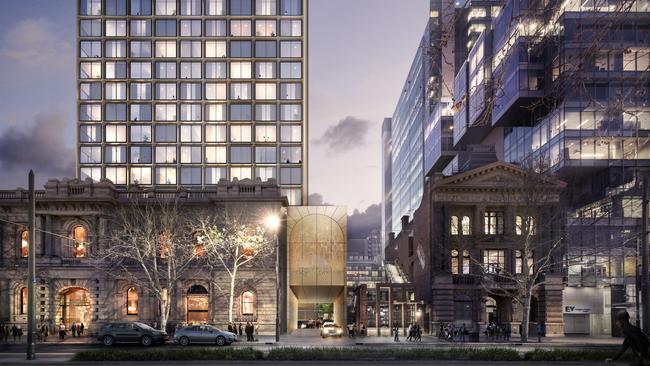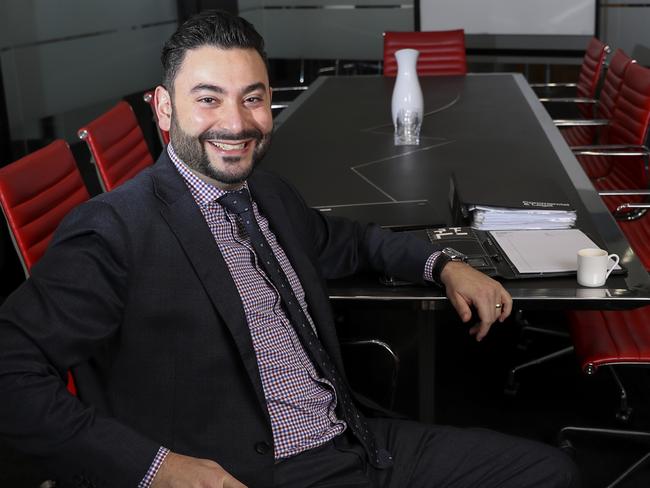Big brand hotel operators are eyeing the Adelaide CBD as the high end SA market looks up, but building a hotel is far from easy
IT’S not easy building a hotel in Adelaide — but change is ahead, with the Westin hotel set to usher in new heights of luxury atop the GPO building overlooking Victoria Square.
- Westin to operate new $200m GPO hotel, create 250 permanent jobs
- TraveLodge will be an 18-storey tower on tiny CBD space
- Atura Hotel at the Airport
- Student accommodation tower on North Terrace and Frome St
- 18-storey tower to be built over Hotel Wright St
- Who owns Adelaide?
IT’S not easy building a hotel in Adelaide, says Elias Farah, but change is ahead with the Westin hotel set to usher in new heights of luxury atop the GPO building overlooking Victoria Square.
Mr Farah, the founding partner of Commercial & Legal solicitors and a leading name in hospitality transactions, says the building — with 285 rooms in a 15-storey tower — will be a gamechanger for Adelaide and pivotally, not just for its guests.
If you want a glitzy or up-market night out in Singapore or Dubai, he says, you would go not to a stand-alone restaurant but to a hotel.
“They have that amenity. The Westin in Adelaide won’t be just for interstate guests — it’s designed for the local CBD resident or worker at lunch and dinner,” he said.
“As someone who lives here, I’m not going to stay there but I can go there for a drink or to dine. We’ve missed out on this before.”

The high end Adelaide hotels, Mr Farah says, just aren’t cutting it.
The Hilton Adelaide, despite a good restaurant and adjacent lobby, remains under-utilised. The Intercontinental has long drawn accusations of minimal atmosphere within its lobby, while the new Mayfair Hotel boasts a credible, if arguably disconnected, basement restaurant.
“Visit Sydney and their CBD hotels are a big step up, with bars on level 40,” Mr Farah says.
“The Intercontinental has 360 degree views, the Westin is tremendous, with a real buzz in its lobby which is a positive attraction.”
This, Mr Farah says, is what Adelaide needs.
But a shift is happening. Operators, previously unknown here, are now hovering — and with good reason.
A 2017 survey by tourism advisory company, Dransfield, makes the point, showing Adelaide faring well in revenue growth, with its 5763 hotel rooms projecting growth of 6.7 per cent this year.
Indeed, there are six new upscale CBD hotels brewing, Mr Farah says, with advanced plans on two serviced apartment blocks.

“All of a sudden, we have interstate operators trying to get all their brands into SA,” he says. “It’s about who gets in first and, as an operator, you have to back the right horse.”
Which is where it gets interesting. There have been plenty of previous well-publicised announcements of hotels supposedly on the way — except they often didn’t happen.
This, says Mr Farah, is why.
It starts with the developer putting together an information memorandum (IM) — a rough exterior sketch and basic detail, which he issues to select operators. One IM covers all, from luxury groups to standard to serviced apartments — the best returns are not necessarily from five-star offerings.
The IM, meanwhile, is prepared by an agent working on a commission — the cost is generally less than $100,000 for the developer whose job is to pick the right operator and sign a term sheet. This for a hotel that might be worth more than $100 million.
But for a term sheet — a basic agreement between developer and prospective operator — to be enforceable, there has to be certainty.
”If the developer doesn’t come up with the goods, you go back to square one. That’s why operators are backing multiple horses,” Mr Farah says.

And certainty only arises much later.
“Until we work through the design, there is no accurate forecast. Only when you have a cost to it, and know the returns, can you plan properly,” Mr Farah says.
“You’ve got all these balancing factors. You want complete clarity on design and what it might cost to build.”
It’s time-consuming, too, with six months minimum from signing the term sheet to proper clarity.
And which is when many developers jump the gun and hotfoot it to the media with their plans.
“You need to curb your excitement,” Mr Farah says.
“You’ve signed an operator on a term sheet and if you haven’t done this before you’d be very excited; everyone in town is thanking you for bringing a Sofitel-level hotel to Adelaide but you still don’t know what it’s going to cost you.”
Not everything, though, is a downer.
To buy land in the CBD is nowhere near the price of buying land interstate, thus the barrier to entry is much lower.
“And that allows anyone to do it; there’s zero chance in Sydney,” Mr Farah says.
“A good Sydney CBD site might cost $50 million but it’s $5 million here.”
Adelaide’s best site in all probability, the GPO building — the site of the Westin Hotel — sold to developer Nicho Teng for $20 million.
“Interstate, if you spend $50 million on a site you have to deliver because costs will bankrupt you,” Mr Farah says.
“In SA, if you spend sub-$10 million on a site and there is holding income, financially you can delay — the pressure is not the same. That’s why we see a different practice here.”
Private ownership dominates the SA hotel market and operators invariably give a developer a large window to get the job started.
More than three years after it was announced, work is yet to begin on the planned Sofitel on Currie St, but such a wait is far from unusual.
It is, paradoxically, a good faith unseen outside the hotel sector. An Aldi or Bunnings understandably would expect more timely outcomes.
Developers, says Mr Farah, exhibit a lot more understanding with hotels.
Then there’s financing, convincing a bank in SA to lend tens of millions to build it.
“The big deals all go to interstate credit teams for approval; you’re not going to get major funding 100 per cent in SA,” Mr Farah says.
A further worry is the perception from Sydney that comparing itself with Adelaide is akin to South Australians measuring Adelaide with a rural town.
“They’re still laughing over there about our electricity blackouts,” he says.
Hotels are far less risky than an office tower, where tremendous tenant incentives may be needed to guarantee 100 per cent occupancy.
The approval on Thursday of the mixed-use 75 King William Street Hotel and retail project is just the beginning, Mr Farah says.
“The addition of apartments is double-edged sword,” he says.
“If you’re just building a hotel, there are not that many milestones. You bring apartments into the mix and it really complicates things. You have to think about the difference in services, residents not sharing the same lift as guests — you lose efficiencies.
“You’ve got challenging pressures trying to promote the sale of apartments. There’s pressure if 75KW remains a mixed-use project.
“With a hotel you realise the capital gain but you’re not drawing money out. Apartments are a nice addition because, on completion, you have an influx of money, the best of both worlds. If you can pull it off.”
